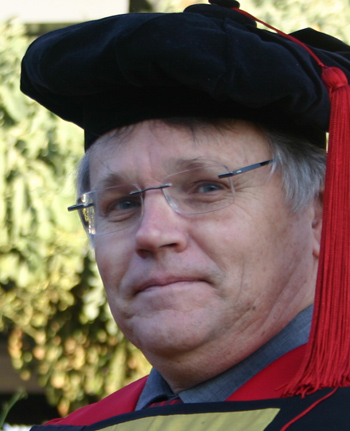Latest News Archive
Please select Category, Year, and then Month to display items
02 January 2025
|
Story Gerda-Marie van Rooyen
|
Photo Supplied
 Leading the research in South Africa is Prof Linus Franke from the Department of Soil, Crop and Climate Sciences.
Leading the research in South Africa is Prof Linus Franke from the Department of Soil, Crop and Climate Sciences.
Scientists are actively pursuing the successful breeding of diploid hybrid potatoes from inbred lines. This is expected to revolutionise potato breeding as it holds the key to rapid genetic progress. It will introduce new varieties for commercialisation through seed. Currently, existing potato variants have a gene that renders self-pollinated seeds infertile.
Prof Linus Franke, an academic in the Department of Soil, Crop and Climate Sciences at the UFS, is leading the research in South Africa. “This technology allows the production of genetically uniform potato seed that is easy to transport and largely disease-free.” He says this differs from conventional breeding whereby only vegetative propagation is possible due to tetraploid varieties in potatoes. It also risks carrying pests and diseases from one generation to the next – leading to the accumulation of pests and diseases with each round of multiplication.
Seed innovation
Prof Franke explains that Solynta BV, a seed company based in the Netherlands that produces potato varieties that can be grown from seed, has included South Africa in their research efforts because it is one of Africa’s largest producers and exporters. Through his academic relationship with Wageningen University and Research, a Dutch institution renowned for its agricultural endeavours and food production, the UFS became involved in researching hybrid potatoes grown from seed.
Diploid seeds containing two sets of chromosomes allow easier gene manipulation to increase predictability and speedier genetic progress. The breeding approach enables the incorporation of tolerance to pests, diseases, abiotic stresses (cold, heat, drought) and other desired genetic traits.
Although Prof Franke is optimistic about this research, he is not blind to disadvantages. “Potato seeds are tiny and have little energy reserves, making it harder to grow potatoes from seed than from tubers.” He says potatoes from seed will take longer to cultivate than tubers, as farmers need to grow plantlets from seeds first, adding six weeks to the growing period. “It is possible that commercial farmers can grow potatoes directly from seed. Alternatively, perhaps more likely, specialised growers will produce tubers of potatoes from seed; these tubers are then sold as seed tubers to other potato farmers, who then continue their normal practices of producing potatoes for the market from tubers.”
Financial benefits
Prof Franke says farmers have reason to get excited. “Seed potatoes will reduce input costs, as varieties with enhanced tolerance to pests and diseases require less pesticides. Planting one hectare of potatoes requires three to four tonnes of potato tubers, but only one 25 g packet of potato seeds.” Since potatoes are a more valuable commodity than maize, this technology might also increase farmers’ income potential.
Prof Britz heading to Yale
2013-04-22
|
 |
Prof Dolf Britz
Photo: Supplied
22 April 2013 |
Prof Dolf Britz has been awarded the honour of an appointment at Yale Divinity School (YDS) at Yale University in New Haven, Connecticut, in the United States. Starting in August 2013, Prof Britz will be involved in research initiatives and the teaching of post-graduate seminars at the university, which was founded in 1701.
The appointment is the natural progression of a collaboration agreement between the University of the Free State (UFS) and Yale University which dates back to 2009 with the formation of the Jonathan Edwards Centre Africa. The strategic partnership focuses on increasing African access to quality education and is geared towards empowering new-generation African leaders in academic and faith-based organisations with primary scholarly resources, research, education and publication.
Prof Britz’s appointment is equally exciting to the respective faculties involved at the UFS and Yale.
“We are most grateful that the generous support by the University of the Free States makes it possible for Prof Britz to be with us in this capacity,” said Prof Carolyn Sharp, Interim Associate Dean of Academic Affairs at YDS.
Prof Adriaan Neele, the Director of the Jonathan Edwards Center at Yale and extraordinary professor at the UFS, thinks Prof Britz’s appointment can be just as beneficial to YDS students.
“Prof Britz’s keen insight in historical primary sources will be very beneficial to Yale’s students and the faculty. His appointment demonstrates the strategic nature of the academic relationship between the UFS and Yale,” he said.